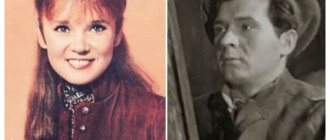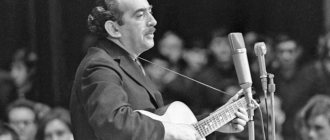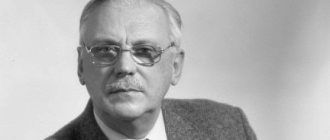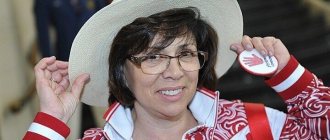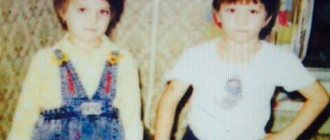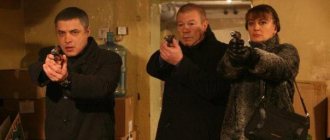Biography
Boris Vasiliev is a Soviet writer, playwright, screenwriter, author of immortal works included in the collection of Russian and Soviet classics. These are, first of all, the stories “And the Dawns Here Are Quiet...”, “Not on the Lists,” and the novel “Don’t Shoot White Swans.”
Vasiliev Boris Lvovich was born on May 21, 1924 in Smolensk into an intelligent family. His father, Lev Aleksandrovich Vasiliev, was a career officer in the Tsar’s and later the Red Army; his mother, Elena Nikolaevna Alekseeva, was from an old noble family associated with the names of Pushkin and Tolstoy, and with the social movement of the Populists.
Writer Boris Vasiliev
The boy was interested in history and literature, and these two subjects “were intertwined in his mind from childhood.” Later, the family of a full-time military man moved from Smolensk to Voronezh, where Boris studied. At school, the boy played in amateur performances. And together with a friend he published a handwritten magazine.
Carefree school years were interrupted by the war. In 1941, Boris Vasiliev was in 9th grade. Childhood ended in an instant. At the age of seventeen, Vasiliev went to the front as a volunteer as part of a Komsomol extermination battalion. On July 3, 1941, Vasiliev’s battalion was sent to Smolensk, was surrounded and only emerged from it in October 1941.
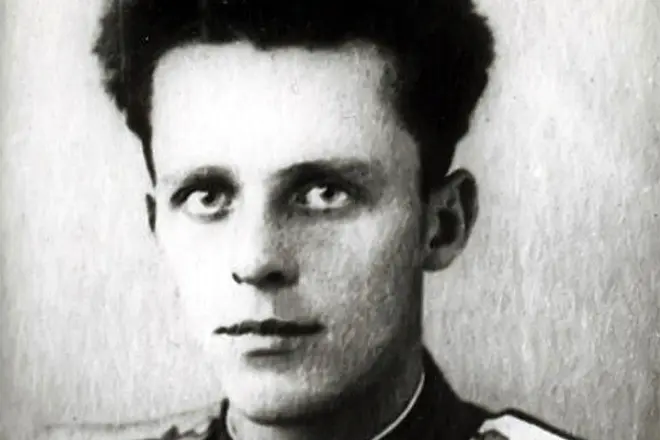
Boris Vasiliev in his youth
On March 16, 1943, during an airborne assault near Vyazma, Vasiliev was caught in a mine trip and was taken to the hospital with a severe concussion. After a shell shock, Boris Lvovich left the active army. In the fall of 1943, he entered the Military Academy of Armored and Mechanized Forces named after Stalin, graduating in 1948, and worked as a combat vehicle test engineer.
All these years, literature and writing beckoned with terrible force. The war produced many epic pictures and heroic characters that were just begging to appear on the pages of novels. In 1954, Boris Vasiliev made up his mind: he retired from the army with the rank of engineer-captain and made the final choice in favor of professional literary activity.
Vasiliev, Boris Lvovich
Father - Lev Aleksandrovich Vasiliev (1892-1968) - a career officer in the Russian Imperial Army, later in the Red Army[4]. Mother - Elena Nikolaevna Alekseeva (1892-1978), from the nobility.
He studied in Smolensk, in 1941 Boris Vasiliev graduated from the 9th grade of the Voronezh Exemplary Secondary School No. 5 (now - secondary school No. 28, on the building on the side of Friedrich Engels Street there is a memorial plaque in memory of B. L. Vasiliev).
With the beginning of the Great Patriotic War, Boris Vasiliev went to the front as a volunteer as part of a Komsomol fighter battalion; on July 3, 1941, the battalion was sent to Smolensk, where it was surrounded. Vasiliev independently emerged from encirclement in early October 1941. He was sent to the regimental cavalry school, and then to the machine gun school, after which he served in the 8th Guards Airborne Regiment of the 3rd Guards Airborne Division. During the airborne assault near Vyazma on March 16, 1943, he fell into a mine trip and was taken to the hospital with a severe concussion[5]. After this injury, Vasilyev and his recovery, in the fall of 1943 he was sent to study at the Military Academy of Armored and Mechanized Forces named after I.V. Stalin.
In 1946 he graduated from the engineering faculty of the academy and worked as a tester of wheeled and tracked vehicles in the Urals. In 1952 he joined the CPSU. He was transferred to the reserve from the Armed Forces of the USSR in 1954 with the military rank of captain-engineer.
Vasiliev’s literary debut was the play “Tankmen” (1954), dedicated to the change of generations in the country’s post-war army. The play, called “Officer” after two test performances at the Soviet Army Theater, has not been staged since December 1955. Vasiliev continues to master drama and tries his hand as a screenwriter. After Vasiliev graduated from the studio at the USSR State Cinema Committee, feature films were produced based on his scripts: “The Next Flight” (1958), “Long Day” (1960). In 1971, the film “Officers” was released, which became widely known in the USSR. He wrote scripts for KVN and subtexts for film magazines.
Boris Vasiliev's first prose work - the story "Ivanov's boat" - was accepted for publication in the magazine "New World" in 1967, but was published only in 1970 (No. 8-9). The story was filmed by director Mark Osepyan in 1972, but the film was “shelved” and released only in 1987.
The writer gained the greatest fame in 1969 after publication in the magazine “Youth” (

In 1970, the story “The Dawns Here Are Quiet...” was transferred to the stage of the Taganka Theater and became one of the most famous productions of the 1970s. In 1972, the work was filmed by Stanislav Rostotsky.
The writer constantly refers in his work to the theme of the Great Patriotic War and the war generation of Soviet people: “I wasn’t on the lists” (“Yunost”, 1974, No. 2-4); “Tomorrow there was a war” (“Yunost”, 1984, no. 6), in the stories “Veteran” (“Yunost”, 1976, no. 4), “The Magnificent Six” (“Yunost”, 1980, no. 6), “Whose are you?” , old man? (“New World”, 1982, No. 5), “The Burning Bush” (“3name”, 1986, No. 2).
The writer paid attention in his work to modern acute social topics (“Don’t shoot (at) white swans”, “Youth”, 1973, No. 6-7) and Russian history.
In the last years of his life, he published a number of novels from the early history of Rus': “Prophetic Oleg” (1996), “Alexander Nevsky” (1997), “Olga, Queen of the Rus” (2001), “Prince Svyatoslav” (2006), “Vladimir the Red Sun” "(2007), "Vladimir Monomakh" (2010).
Member of the Moscow Writers' Union and the Russian Cinematographers' Union, academician of the Russian Academy of Cinematographic Arts "Nika".
Lived in Moscow on Chasovaya Street, building 5-B.
He died on March 11, 2013 in Moscow at the age of 89[6]. The cause of the writer’s death was chronic atrial fibrillation of the 3rd degree, which led to circulatory failure. On March 14, he was buried at the Vagankovskoye cemetery, next to his wife (site 42).
Family
Wife (since 1945) - Zorya Albertovna Polyak (1926-2013), designer and television editor; served as the prototype for Sonya Gurvich (“And the dawns here are quiet…”) and Iskra Polyakova (“Tomorrow there was a war”)[7]. She died of bronchitis in the hospital intensive care unit. The writer took her death very hard.
Literature
The literary debut and the beginning of the creative biography of Boris Vasiliev was the play “Tankmen”, published in 1954 and dedicated to the change of generations in the army of the post-war country. But the play, called “Officer,” after two test performances at the Soviet Army Theater in December 1955, was banned by the Main Political Directorate of the Soviet Army without explanation.
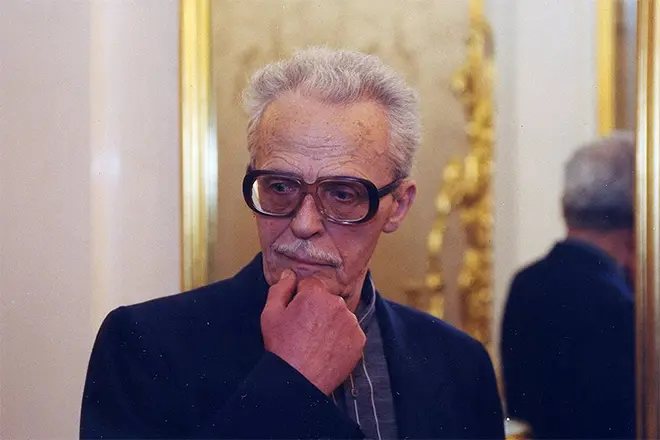
Boris Vasiliev
After this failure, Vasiliev continued to study drama. His play “Knock and it will open” was staged in 1955 by the theaters of the Black Sea Fleet and the Group of Forces in Germany.
Vasiliev is also trying his hand as a screenwriter. Here his work bore fruit generously: the feature films “Another Flight” and “Long Day” were produced based on Boris Vasiliev’s scripts. And in 1971, the film “Officers” was released, which gained wide popularity.
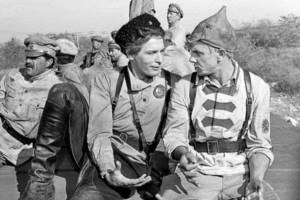
Still from the film "Officers"
Then failure again. Vasiliev’s first prose work, “Ivanov’s Boat,” as well as the play “Tankmen,” faced a difficult fate. In 1967, Tvardovsky accepted the story for publication in Novy Mir, but the work was published only in 1970.
Boris Vasiliev learned what real glory is in 1968, when his famous story “And the Dawns Here Are Quiet...” was published in the popular magazine “Yunost.” This year marks the beginning of the writer’s long and successful collaboration with the magazine Yunost. The best works of Boris Vasiliev were first seen on its pages. Just a year later, the story “The Dawns Here Are Quiet...” was staged at the Taganka Theater and became one of the most famous productions of the 1970s. And in 1972, the story was successfully filmed by Stanislav Rostotsky. Then - two more film adaptations.
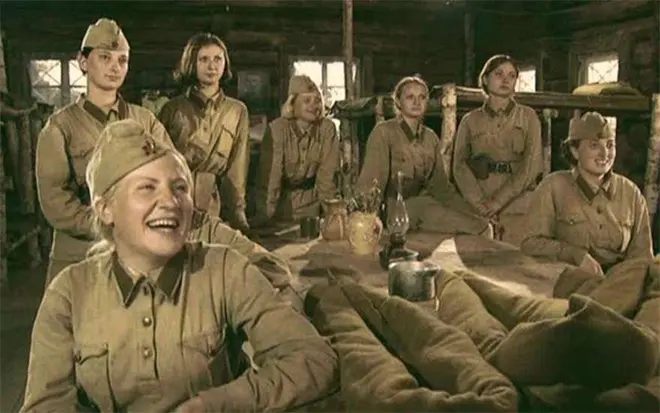
Still from the film adaptation of the novel “The Dawns Here Are Quiet...” (1972)
Boris Vasiliev addresses the theme of war in most of his works. The stories “Not on the Lists”, “Tomorrow there was a war”, the stories “Veteran”, “The Magnificent Six”, “Whose are you, old man?”, “The Burning Bush” - these are all the Great Patriotic War. All of these works have been filmed. Some several times.
The work “Don’t Shoot White Swans” appeared in print in 1973 and immediately took a special place among the author’s books. The main character of the novel, Yegor Polushkin, is an ordinary forester who enters into an unequal battle with poachers for the forest territory entrusted to him. As a result, Yegor dies, like the swans he protected from the villains. The conclusion to which Vasiliev leads the reader is the vulnerability of good, the need to protect it by the whole world, and not alone.
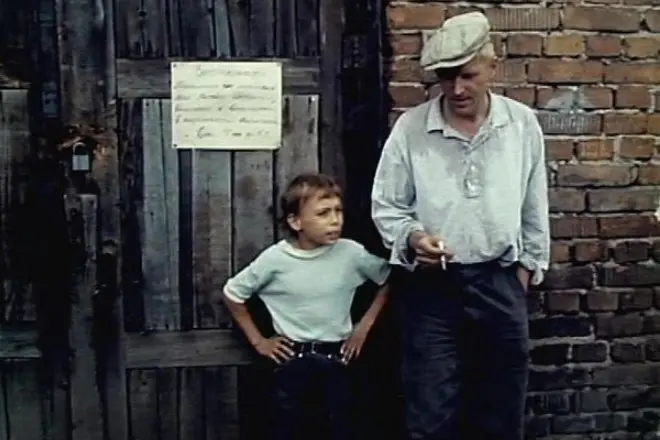
Still from the film adaptation of the novel “Don’t Shoot White Swans”
Boris Vasiliev dedicated the novel “They Were and They Were Not,” which was published in 1977, to his ancestors and the fate of the Russian intelligentsia. The book described the events of the 19th century, the Russian-Turkish war, in which the writer’s two great-grandfathers took part.
Another facet of Vasiliev’s work is historical novels. In recent years, a number of novels on the theme of the early history of Rus' have been published from the pen of Boris Lvovich: “Prophetic Oleg”, “Alexander Nevsky”, “Prince Svyatoslav”, “Vladimir the Red Sun”, “Vladimir Monomakh”.
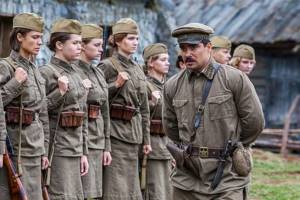
Still from the film adaptation of the novel “The Dawns Here Are Quiet...” (2015)
Boris Vasiliev openly expressed his support for Perestroika, and then for the new regime that was established under Boris Yeltsin and Vladimir Putin. In the late 80s, the writer became a deputy of the First Congress of People's Deputies of the USSR. And soon he handed over his party card to the CPSU. In 1993, he signed the “Letter of Forty-Two,” a public appeal from liberal-minded intellectuals to the president with a request to use force to disperse the Supreme Council.
In the 2000s, Vasiliev re-entered public life, taking a seat on the Commission under the President of the Russian Federation for Human Rights.
Cause of death
Alexander Vasiliev, whose biography is presented in this article, has recently been seriously ill. He underwent several operations, but doctors still could not predict a positive result. And yet he got married to his wife. Tatyana Borisovna is currently engaged in monumental painting. She creates beautiful portraits of famous actors.
On the last day of March, it became known that actor Alexander Vasiliev, a biography whose photo is available on our website, died in the city on the Neva. He devoted almost 30 years of his life to cinema.
Personal life
The personal life of Boris Vasiliev is closely connected with the only woman - his wife Zorya Albertovna Polyak. The young people met in 1943, when, after being discharged from the hospital, Boris Lvovich was sent to study at the Military Academy.
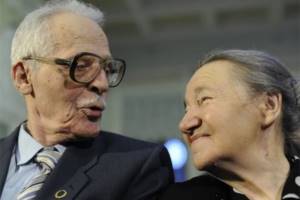
Boris Vasiliev with his wife
Later, Vasiliev recalled his first date with his future bride. The young people became interested in collecting forget-me-nots and ended up in an uncleared field. Since Boris was already short-sighted in those years, Zorya took him out of the field. This incident became significant for the writer. As Vasiliev later claimed, his whole life was a minefield through which he walked for his love.
The lovers got married in 1945. Zorya Albertovna worked as a designer and television editor at Ostankino. With the participation of Vasilyeva, the program “With all my heart” was released, hosted by Valentina Leontyeva.

Writer Boris Vasiliev
Zorya Albertovna was a real fighting friend and muse of the writer. And the wife also became the prototype of Sonya Gurvich from the story “And the Dawns Here Are Quiet...” and Iskra Polyakova from the novel “Tomorrow there was a war.” Since Vasiliev left military service early for the sake of writing, he lost both his salary and his pension, so in difficult days the couple lived only on their wife’s money. This was the case after the filmed play based on Vasiliev’s play “Officer,” and also in the 90s, when the writer was left without a livelihood. Then the Vasilyevs survived thanks to their dacha in Solnechnogorsk.
Boris and Zorya did not have children of their own, but they invested a lot of effort in raising their wife’s cousin, who was also named Zorya. Later, the couple adopted the boys Nikolai and Peter.
Death
On March 11, 2013, a year before his 90th birthday, Boris Lvovich Vasiliev died in Moscow. On March 14, the writer was buried with military honors at the Vagankovskoye cemetery, next to his wife Zorya Albertovna. She passed away in the same year of 2013, as did her adopted son Nikolai. Boris Vasiliev was able to survive them for only two months.
The cause of the writer’s death was chronic atrial fibrillation of the 3rd degree, which led to circulatory failure. Before his death, Boris Lvovich planned to be hospitalized at the Central District Hospital, but did not have time.
The most interesting

A fan of Jolie has undergone many operations, wanting to be like the actress (12/15/2017)

She studied with inspiration - a dream came true, and soon she will play on stage, which she has dreamed of since childhood. During this period, the cinematic biography of Vera Vasilyeva began - in her second year she starred in an episode in the film “Twins”, and a year later she was invited to the role, thanks to which the aspiring actress became a real movie star.
In the film "The Tale of the Siberian Land"
It was the film “The Tale of the Siberian Land,” in which Vasilyeva played a simple village girl Nastya. Her partners on the set were famous actors - Marina Ladynina, Vladimir Druzhnikov, Boris Andreev, next to whom the aspiring artist felt awkward and tried to stay away.
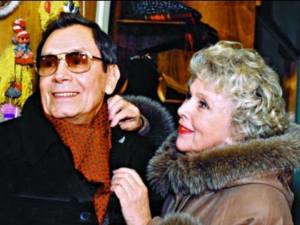
She did not expect that this role would put her on a par with them, and that the state would award her the Stalin Prize.
